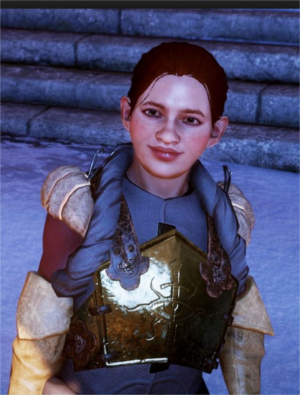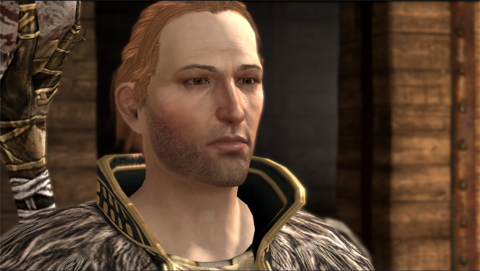Dragon Age: Inquisition Diary 4: Why Having Your Choices Imported Really Matters
Spoiler Alert: This and all subsequent entries into the series may be rife with spoilers! You have been warned!
[Spoiler Alert: This and all subsequent entries in this series may be rife with spoilers! You have been warned!]
So FINALLY, I’m off and running with Dragon Age: Inquisition! All of my choices and decisions from the earlier games have been imported into my new game, so it’ll really be MY story.
I want to give you two quick examples of why this was worth all the teeth-grinding trouble I went through to get it to happen.
My Buddy Dagna
A couple dozen hours into the game, you need to find an enchanter for your workshop. This enchanter turns out to be a chirpy dwarf female named Dagna. She’s delighted to be your new employee and she cannot wait to get to work.
If you are new to the series, it will seem as though nothing is exceptionally noteworthy about this new character. However, it turns out that Dagna has a very interesting backstory. She’s a dwarf, and in the world of Dragon Age, dwarves and magic simply do not mix. (You cannot create a dwarf mage, for example.) So it’s extremely weird that a dwarf would be your enchanting expert, right?

Well… way back in the first game, Dragon Age: Origins, your character, “The Hero of Ferelden,” meets the younger version of Dagna in Orzammar, the splendid underground dwarf capital. She informs you that she’s desperate to go study magic with the mages, but of course, no one will take her request seriously. In a purely optional quest, you can decide to use your influence to make Dagna’s educational dreams come true. Since I always play Dudley Do-Rights — über-helpful characters — I naturally decide to help Dagna’s cause. Her story ends with her eagerly heading out to begin her studies.
When you meet Dagna, she describes how she came to be your enchanter. If, in the original Dragon Age: Origins game your character made the decision to help her get her magical education, and you import that decision into the game via the Dragon Age Keep, that good deed will be a part of Dagna’s description of how she became your enchanter. It’s a subtle but powerful touch that reinforces the idea that you’re creating YOUR story.
Now, let’s unpack that just a bit. The fact is that whether you play the first game or not, and whether you help Dagna or not, she is the character who turns out to be your enchanter. So what difference does helping her make? None, in the big picture of the game. But to simply have her include your earlier character’s actions in her backstory is thrilling. It made me feel responsible for having her there, and for helping her have the life she wants to have.
Oh, Anders
In the second major game in the series, imaginatively named Dragon Age II, you play Hawke, the head of a troubled family that gets embroiled in a city’s politics. One of the more fascinating characters in your party is a mage named Anders, who first appears as a character in the expansion for the first game (Awakening).
Anders became my character’s romantic companion throughout the course of the game (which was awesome, thank you Bioware). However, things got a bit dicey when the troubled mage blows up the Templars’ headquarters, killing many people. I managed to save his life and preserve the romance, but it wasn’t easy.

So: Hawke makes a surprise (and very welcome) appearance in Dragon Age: Inquisition. When you’re talking with him, the touchy subject of Anders comes up. By now, Anders is, of course, a quite notorious figure. Since he was my Hawke’s boyfriend in Dragon Age II, during the chat about Anders, I got the opportunity to say, “Uh, I understand you and Anders were… you know…”
To which Hawke responded (I’m paraphrasing heavily here): “Yep. Him blowing up the Chantry certainly complicated our relationship, believe me.”
Hilarious, and again, since it’s MY story, quite meaningful.
Once again, I praise Bioware for going to the trouble to make sure we could play Dragon Age: Origins as a continuation of our own story.
Next up: Learning to play the game!

Leave a Reply